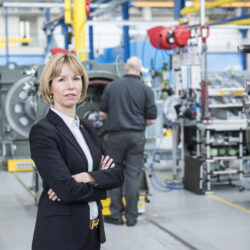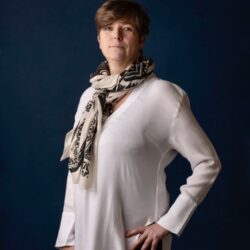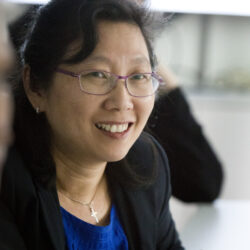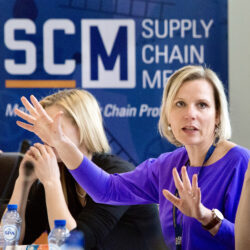Sabine Simeon: “We now drive the diversity narrative from a business perspective, creating real results”

Global Women Supply Chain Leaders Awards 2020 (GWSCL 2020) is the first global event to shine the spotlight on the dedication, passion, and incredible success stories of women in the supply chain – cross-domain and from around the world. The 3-day mega event, starting from September 22, will be packed with panel discussions, live Q&A, keynote speeches and loads of networking opportunities. This will finally culminate in the virtual awards ceremony on September 24.
As part of the awards, B2G Consulting (headquarted in Singapore) conducted interviews with some of the Top 100 Influential Women in Supply Chain. Following is the interview conducted with Sabine Simeon, Head of Supply Chain Europe at Schindler Group. As official media partner of this event, Supply Chain Media publishes the second interview.
How did you decide to pursue a career in supply chain?
”I’m a mechanical engineer by training, so the production and use of engines is a natural interest. Hence, after university I decided to pursue production jobs at industrial companies. I quickly received a rude awakening. As one large automotive company told me bluntly: as a woman, I needn’t apply.
They managed to convince me that as a woman I could only get jobs in the Quality Department, and so I started in quality control for a pharma manufacturer. I quit after three months, as my skillset and ambition didn’t match the role. I couldn’t see how I’d be able to contribute there. Luckily, I found my way to Schindler.”
What is your greatest career accomplishment?
”Building the right team. My team is collaborative and has wide-ranging skills, which allow it to absorb the needs of the suppliers on the one hand and customers on the other, while creating value for the company. And the collaborative approach (i.e. having everyone in the right spirit and with the same vision) makes us more efficient. Not everyone is always involved in every step of the way, but individual team members trust each other. We have gone through big change in terms of maturity and turnover, but the team has always been engaged to go beyond their daily tasks and think about the strategy and the future, while participating in the shared vision.”
What contribution have you made to the supply chain industry/your organization that is most meaningful to you?
”Within my ecosystem I have become a role model – for the wrong reasons, but with the right impact. I say this because there are few women in positions like mine: I have been visible because I was the only woman at the top. However, this lack of diversity became a driver for change. As the chairwoman of the diversity committee at Schindler, I had the opportunity to be different and succeed. By elevating diversity as a topic of discussion, we have been able to create momentum. In my role as chairwoman, I fight against stigmatization and marginalization. More importantly, we now drive the diversity narrative from a business perspective, creating real results.”
Your thoughts on how the industry has changed for women from the time you started your supply chain journey?
”The elevator industry has grown tremendously in the past 20 years. Business has expanded beyond the traditional markets of Europe and America – demand in emerging countries (especially in Asia) is booming. New business opportunities are also creating a need for change. The business context is different in each geography. This is a great opportunity to change how business is conducted in the future. In my opinion, gender diversity shouldn’t be a topic, it should just be a given. One solution is to implement business models in new markets that works for everyone, including local female talent.
In terms of professional life, we are now witnessing that women have fewer restrictions placed upon them by society. They can increasingly pursue successful careers, also in traditionally male dominated arenas such as engineering and supply chain. This is especially true in emerging countries such as India and China where technical education is becoming more accessible to women. As more successful women leaders emerge and become role models, more women will find the courage to pursue their dreams.”
What do you think companies can do to make supply chain careers more attractive to women?
”Supply chain management today is more about communicating the various aspects of supply chain – manufacturing, logistics, procurement. It is crucial to increase awareness of the range and scope of supply chains. I promote supply chain at the annual Schindler talent fair to young people (regardless of their gender). Supply chain is more prominent in the automotive sector and even in the retail industry. Other industries need to make the role more visible through communication and role modelling.
At Schindler, I promoted a woman to deputy plant manager. She is the first one and it is a very visible position. She is a new mother and worked part-time. My choice was driven by her potential and her willingness to take the challenge, not by the gender. As a team, we make it work with a shared job approach.”
If you could do one thing to leave your mark on the supply chain industry, what would it be?
”I remember a conversation with my daughter when she was researching universities and which curriculum she would like to follow. She is highly ambitious and she didn’t consider any barriers or roadblocks, everything is possible. We had some arguments because she didn’t see that being a woman would be a topic under any circumstances. We then went through the Fortune 500 companies list, she selected her “top” five, and we looked up the executive committee and board. She was speechless: she realised that very few to no female leaders were listed. I didn’t want to ruin her ambition. I just wanted her to realise that some steps are still needed. It will take a few more decades before we will see a balanced situation in companies and in society, but every moment of awareness and discussion helps to move forward.
This is perhaps the mark I would like to leave on the supply chain industry, as a role model. I’m a professional in my expertise, I’m a wife and mother, I’m a friend, a daughter and a sister and all of that is possible. There is no need to choose. Even better I have a lot of inspiration every day to do more and better.”
How would you use this recognition to influence others and how would it impact your career?
”I don’t do things because I expect to get immediate impact for myself. I believe that if I do my job with honesty, ethics and professionalism the result cannot be wrong. This formula has worked well in my past 20 years. I don’t plan next my career, I know what is inspiring me, what I would like to learn, and which projects I’d like to develop. I hope this will help Schindler and the industry to continue its success.”
If you want to know more about the top women leaders in the supply chain industry, register for the GWSCL 2020 now at https://gwscl.b2g-consulting.com/gwscl-main-page.
If you want to read more about gender diversity, read the following content:
www.supplychainmovement.com/gender-diversity-checklist-female-talent
www.supplychainmovement.com/boom-global-community-for-women-in-supply-chain
www.supplychainmovement.com/feminization-supply-chain-improving-diversity-thinking










